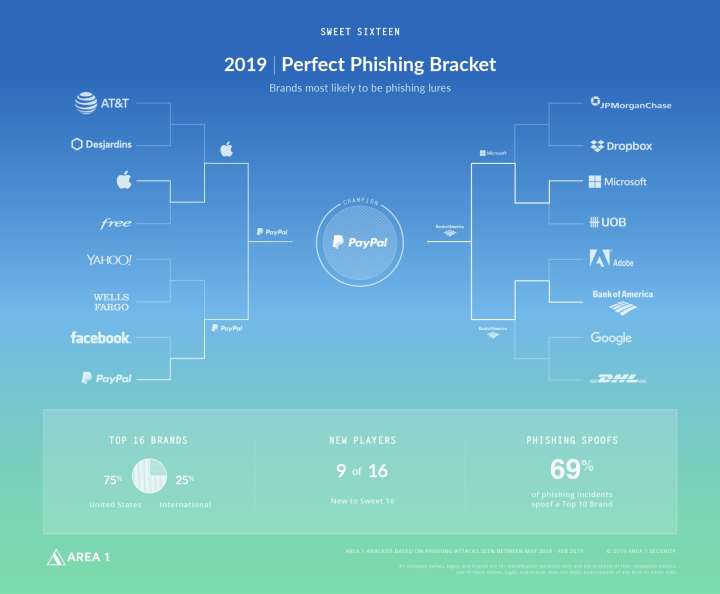
A new report out by Area 1 Security, a performance-based cybersecurity firm, finds that PayPal is one of the largest targets for phishing attacks. Examining a group of attacks between May 2018 and February 2019, the report also finds that some of the world’s most trusted brands, including Apple, are subject to additional targets and spoofs by hackers.
According to the data in the study, 89 percent of all examined phishing incidents spoofed the top 64 brands in the world, such as AT&T, eBay, Amazon, and Facebook. Some of the top phishing lures include cloud services and financial services.
Alongside PayPal, falling in second as the largest target for phishing attempts is Bank of America. In third place is Apple, followed by Microsoft in fourth. Google, Dropbox, Facebook, and JP Morgan also made the top 16 most targeted brands that were favored by cybercriminals.
When compared to last year’s report, Area 1 discovered 29 new brands that are now frequently spoofed by hackers — showing that phishing is always evolving.
As we’ve previously explained, phishing is a tactic leveraged by cybercriminals to fool you into opening fraudulent email messages that could infect your computer and put your information and identity at risk. The issue is quite pressing, and a previous study relating to phishing emails was also recently done by the cybersecurity company Barracuda. That reporting revealed some of the most common phishing email subject lines that hackers use to exploit businesses.
One of the best practices to avoid falling into phishing traps — and the dangers that lurk inside them — is to never open messages from suspicious looking email addresses. You should always verify the sender, and make sure messages are coming from a trusted source. Another great way to protect yourself is to keep your system up to date and ensure that you’re running the latest versions of antivirus software. Multifactor authentication is also a solid option as it can help protect and verify your logins on important online accounts if you’re the victim of a hack.
Google recently released a quiz which helps educate you on spotting the most popular phishing messages. Our guide on creating the best passwords also can be useful to help protect your online accounts.


